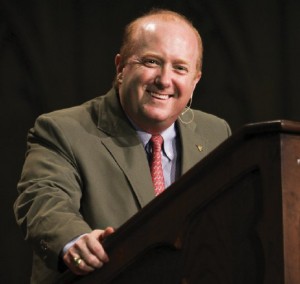Mike Riccardi oversees the membership process at Grace Community Church in Los Angeles. I dont know him personally at all but I loved all he had to say in it is veiled to those who are perishing.” – 2 Corinthians 4:3
In 2 Corinthians, Paul writes primarily to defend his own apostleship against certain men whom he later dubbed false apostles (2 Cor 11:13). These men were teaching that Paul was not a true apostle, and were advancing many attacks against both his character and his ministry, to the point that the Corinthians began to doubt Paul, and thus doubt the gospel he preached.
For example, these false apostles accused him of being under God’s judgment because of his constant sufferings. The thought was that if Paul was really sent from Christ he wouldn’t have such opposition and turmoil, but rather that God would bless him. And so in 2 Cor 1:3-11 Paul defends himself by saying that his sufferings for the Gospel are actually a mark of God’s favor. Far from discrediting him as an apostle, sufferings are a badge of his authenticity as a minister of Christ. They also accused him of vacillating, and “purposing according to the flesh” (2 Cor 1:17) because he had changed his plans about coming to Corinth. And so in 2Cor 1:15-22 he defends himself by saying his word to the Corinthians is not yes and no, but yes, just as all God’s promises are yes in Christ. Another accusation was that he was uncredentialed—a sort of Johnny-come-lately apostle, not part of the original twelve. And so in 2 Cor 3:2 he asks the Corinthians, “Do we need letters of commendation to you? You are our letter of commendation. The fact that you now know Christ because of the Gospel we preached to you is evidence of our authenticity.”
In chapter 4, we find that another accusation was that his message was obscure. And that’s a substantial accusation, because the Corinthian culture praised human wisdom, cleverness of speech, and oratorical persuasion. They regarded highly those who were skilled in rhetoric and oratory, and looked down upon those who weren’t. And so these men were saying, “Hey, look, Paul, only a few people are believing your message. If it was true, and you were really sent from Christ, more people would believe!”
Sounds a bit like today, doesn’t it? “If God was really blessing you, you’d have more people in your church! If you really had sound doctrine—and if sound doctrine really mattered!—more people would believe!”
The Church’s Purpose Defined by God’s Purpose
What’s so interesting to me is how extremely instructive Paul’s response to this accusation is for how the Church can be faithful witnesses of Christ in our various spheres of life. He tells the false apostles, “You don’t understand the doctrine of election. It may be that our gospel is veiled—that is, granted: there are many who do not believe our message—but our gospel is veiled only to those who are perishing.”
He says a similar thing in 2 Cor 2:14-16: “For we are a fragrance of Christ to God among those who are being saved and among those who are perishing; to the one an aroma from death to death, to the other an aroma from life to life.” Paul likens the preaching of the Gospel to the emission of an aroma that finds its way into the nostrils of all people. And among those who hear the Gospel there are two kinds of people: (a) those who are being saved and (b) those who are perishing; (a) those whom God chose in Christ before the foundation of the world to be holy and blameless before Him (Eph 1:4), and (b) those whom He did not so choose.
The word of the cross is foolishness to “those who are perishing,” but to “those who are being saved”—the called (1 Cor 1:24)—it is the power of God for salvation (1 Cor 1:18). And so when the elect of God smell the fragrance of the Gospel, it is to them an aroma of life that leads to life. But when the non-elect hear it, it is an aroma of death that leads to death, because the word of the cross is foolishness to those who are perishing.
Christ Himself said the same thing to the Jews in John 10:26-27. He said, “My sheep hear My voice, and I know them, and they follow Me; and I give eternal life to them, and they will never perish. But you don’t believe because you are not of My sheep.” Get that. Not, “You are not My sheep because you don’t believe,” but, “You do not believe because you are not of My sheep. You are not of those that the Father has given to Me” (cf. John 6:37, 39).
And so Paul’s defense against the accusation that not enough people are believing his message is simply: the Church’s purpose in evangelism—and in all facets of Gospel ministry—is to call Christ’s sheep, not the goats, into the fold. You shouldn’t expect the goats to believe the Gospel; only the sheep hear the Shepherds’ voice.
The Implications
Consider the implications this doctrine has for our ministry of the Gospel—for the way we “do church.” If we continue to take the unadulterated, Biblical Gospel to the world and they continue to reject it, that is not a sign of the weakness of the message. It’s not even necessarily a sign of the weakness of the messenger. Rather, it is the outworking of God’s purpose to redeem a particular people: those sheep whom the Father has given to the Son.
And so if we have taken the Biblical Gospel to our neighbors and our coworkers and our communities with the patience and the compassion of Jesus, and they seem uninterested, we shouldn’t conclude that we need to grow a soul patch, start playing secular rock songs, having light shows, performing skits, and playing videos in church to attract them. The church is not called to amuse the goats. Our task is to sound, as clearly as we can, the Shepherd’s voice in the Gospel message and call His sheep who know that voice into His fold. It is the call of the Shepherd’s voice that is the means by which Christ’s flock is brought into His fold. A stranger they simply will not follow, but will flee from him, because they do not know the voice of strangers. So why would we adopt a ministry methodology other than sounding forth the Shepherd’s voice in the preaching of His Word? Why would we implement something else—something that Scripture promises will not attract Christ’s sheep, but will attract the goats? Perhaps it is because we have failed to understand the implications of 2 Corinthians 4:3.
Our gospel is indeed veiled to those who are perishing.
And so a principle for faithful Gospel ministry that Paul gives Christ’s Church in this text is: success in Gospel ministry is measured not by numbers but by faithfulness to the message. Therefore, in what seems like seasons of external failure, we must not ask what offers the greatest appeal, what will fill the most seats, or what will have the greatest “influence.” We must ask, “Have we gotten the Gospel right? Are we preaching the message we’ve received? Are we sounding the voice of the Great Shepherd, or the voice of a stranger?”
 Earlier today, Dr. R. C. Sproul, Jr taught a message at a Ligonier Conference entitled, “Lord of Space and Time.” Here’s an excerpt of notes made:
Earlier today, Dr. R. C. Sproul, Jr taught a message at a Ligonier Conference entitled, “Lord of Space and Time.” Here’s an excerpt of notes made:
 (1) I encourage you to check out the Reformation apparel by clicking on the Missionalwear logo to the right. There are some very cool items that have now become available for both men and women.
(1) I encourage you to check out the Reformation apparel by clicking on the Missionalwear logo to the right. There are some very cool items that have now become available for both men and women.
 “This distinction [between law and gospel] must be observed all the more when the Law wants to force me to abandon Christ and His Gospel boon. In that emergency I must abandon the Law and say: Dear Law, if I have not done the works I should have done, do them yourself. I will not, for your sake, allow myself to be plagued to death, taken captive, and kept under your thraldom and thus forget the Gospel. Whether I have sinned, done wrong, or failed in any duty, let that be your concern, O Law. Away with you and let my heart alone; I have no room for you in my heart. But if you require me to lead a godly life here on earth, that I shall gladly do. If, however, like a housebreaker, you want to climb in where you do not belong, causing me to lose what has been given me, I would rather not know you at all than abandon my gift.” – Martin Luther, quoted in C. F. W. Walther, The Proper Distinction Between Law and Gospel (St. Louis, 1928), pages 46-47.
“This distinction [between law and gospel] must be observed all the more when the Law wants to force me to abandon Christ and His Gospel boon. In that emergency I must abandon the Law and say: Dear Law, if I have not done the works I should have done, do them yourself. I will not, for your sake, allow myself to be plagued to death, taken captive, and kept under your thraldom and thus forget the Gospel. Whether I have sinned, done wrong, or failed in any duty, let that be your concern, O Law. Away with you and let my heart alone; I have no room for you in my heart. But if you require me to lead a godly life here on earth, that I shall gladly do. If, however, like a housebreaker, you want to climb in where you do not belong, causing me to lose what has been given me, I would rather not know you at all than abandon my gift.” – Martin Luther, quoted in C. F. W. Walther, The Proper Distinction Between Law and Gospel (St. Louis, 1928), pages 46-47. We are Christians. Radical, full-blooded, Bible-saturated, Christ-exalting, God-centered, mission-advancing, soul-winning, church-loving, holiness-pursing, sovereignty-savoring, grace-besotted, broken-hearted, happy followers of the omnipotent, crucified Christ. At least that’s our imperfect commitment.
We are Christians. Radical, full-blooded, Bible-saturated, Christ-exalting, God-centered, mission-advancing, soul-winning, church-loving, holiness-pursing, sovereignty-savoring, grace-besotted, broken-hearted, happy followers of the omnipotent, crucified Christ. At least that’s our imperfect commitment. You may have wondered why the Roman Catholic Church includes books in their “canon” that are not in our Protestant Bibles. They include books written in the Intertestamental Period (the 400 years between Malachi and Matthew in our Bibles). These are known as The Apocrypha.
You may have wondered why the Roman Catholic Church includes books in their “canon” that are not in our Protestant Bibles. They include books written in the Intertestamental Period (the 400 years between Malachi and Matthew in our Bibles). These are known as The Apocrypha. Continued from part 3 27 in the New, over a period of about 1,500 years. So how is it that all these 66 books ever got together in the Bible?
Continued from part 3 27 in the New, over a period of about 1,500 years. So how is it that all these 66 books ever got together in the Bible? There are two ditches on the side of the road of Christian life. One ditch is lawlessness (antinomianism), and on the other side, the ditch of a harsh and hostile legalism that binds spiritual chains around us. Both of these extremes should be avoided always. Yet there is a road to walk if progress in sanctification is to be made, and as the saying goes, to fail to plan is to plan to fail.
There are two ditches on the side of the road of Christian life. One ditch is lawlessness (antinomianism), and on the other side, the ditch of a harsh and hostile legalism that binds spiritual chains around us. Both of these extremes should be avoided always. Yet there is a road to walk if progress in sanctification is to be made, and as the saying goes, to fail to plan is to plan to fail. The Greatest News in One Sentence: “That the greatest good (God) offers the greatest action (love) to the greatest need (wrath-owed sinners) by sending the greatest treasure (Jesus) in the greatest invitation (to everyone) into the greatest life (everlasting).” – Jared Wilson
The Greatest News in One Sentence: “That the greatest good (God) offers the greatest action (love) to the greatest need (wrath-owed sinners) by sending the greatest treasure (Jesus) in the greatest invitation (to everyone) into the greatest life (everlasting).” – Jared Wilson